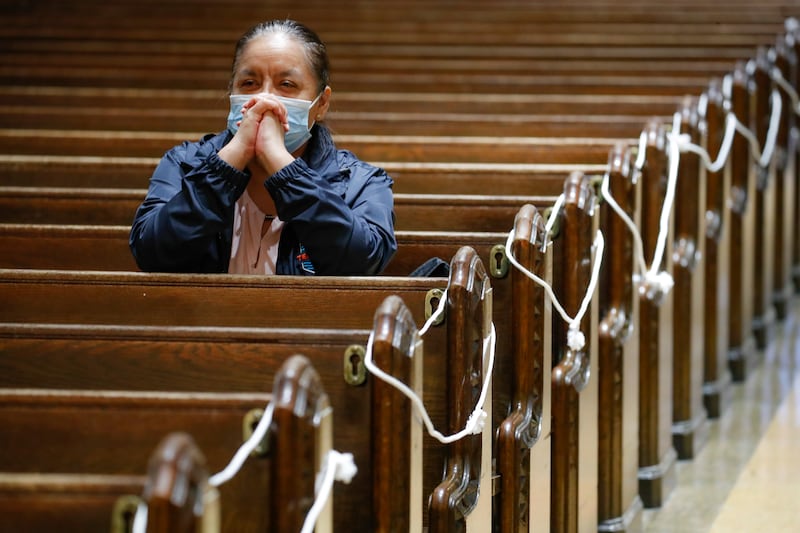This article was first published in the State of Faith newsletter. Sign up to receive the newsletter in your inbox each Monday night.
A recent study shows that, for the first time in at least 80 years, fewer than half of Americans say they belong to house of worship. That may not be as big of a deal as you think.
Many religion experts took to Twitter after the study was released to point out that church membership is not the same thing as belief in God. The share of U.S. adults who have faith in a higher power (around 80%) has remained relatively stable even as the share who join churches or attend worship services weekly has dropped precipitously.
“Americans leave church without leaving religion,” tweeted religion and politics expert Amy Sullivan last week.
Political scientist Ryan Burge makes a similar argument in his new book on religious “nones.” His research shows that the growing group of religiously unaffiliated Americans stays interested in certain aspects of faith after walking away from organized religion.
“The issue is not that interest in spiritual matters has declined; it’s that people do not want to label themselves,” Burge recently wrote for Deseret Magazine.
What Burge, Sullivan and others are trying to say is that you shouldn’t take the new survey as proof that America is going through a spiritual crisis. Instead, take it as further evidence of an institutional crisis. Houses of worship are failing to connect with folks who, in previous decades, might have happily attended and joined a religious organization.
Fresh off the press
It’s been said a million times, so forgive me for saying it again: The COVID-19 pandemic is unprecedented. It stands to reason, then, that the religious holidays celebrated during it don’t feel the same as they usually do. That was the thought that inspired my recent story on why Easter 2021 is an Easter like no other.

Last week, 33 former and current students at 25 religiously affiliated colleges and universities filed a lawsuit challenging the federal policies that enable their schools to treat LGBTQ students differently than others on campus. I took a look at how the legal battle could impact the ongoing Equality Act debate.
Term of the week: Religious exemption
The students who filed a lawsuit against the U.S. Department of Education are specifically challenging the availability of religious exemptions within the department’s anti-discrimination rules. Schools that are granted the exemptions are allowed to behave differently than other colleges. They can, for example, bar a married gay couple from living in married student housing due to a religious belief that marriage should be reserved for unions of one man and one woman.
The Department of Education is far from the only federal agency to offer religious exemptions, which can also be described as faith-based exemptions. A wide variety of policies treat religiously affiliated organizations differently than other groups in order to protect religious freedom and ensure that they can operate according to their faith.
Religious exemptions have become more controversial in recent years, as the battle over LGBTQ rights has heated up and religious affiliation has become less common. One of the reasons the Equality Act limits the application of federal religious freedom law is to ensure that those protections won’t be used to create new religious exemptions to civil rights law.
What I’m reading ...
Becoming a major league baseball player is hard for anyone, but it’s going to be especially hard for Elie Kligman, a star high school athlete and Jew who declines to play in games that fall on the Sabbath. His family is trying to stay positive about his professional prospects and argues that faith should never be seen as a burden. “He’s got six days of the week to do everything he can to be a baseball player, and if colleges and Major League Baseball aren’t inclined to make any changes, then we’ll take what we can get,” Kligman’s dad, Marc, told The New York Times.
Speaking of baseball, the MLB grabbed headlines last week when it announced it was moving its 2021 All Star Game and draft out of Atlanta due to Georgia’s controversial new voting law. The African Methodist Episcopal Church and other Black Christian groups have announced similar plans, arguing that members should boycott Georgia-based companies that didn’t do enough to stop the law from passing, including Coca-Cola, according to Religion News Service.
Odds and ends
Later this spring, I’m hosting a virtual event for Religion News Association that will feature another religion reporter discussing the backstory behind one of their recent projects. It’s up to me to choose the featured writer and story, and I need your help to make my pick. What’s the best religion story you read in 2020? Who would you want to hear from?


